March wrapped up the first quarter of my year of health experiment. For 2021 I decided to focus on a different health topic each month rather than making new year resolutions that rarely stick.
These topics include diet, nutrition, relationships, sleep, stress management, and so on. Each month I pick a nonfiction book on specific subject to read in the first half of the month and then try to implement what I’ve learned in the second.
March Topic: Nutrition
Nutrition is a topic I find endlessly fascinating. I believe nutrition is the most important area of health. Although sometimes it feels like a battlefield to navigate with all of the conflicting information, extreme opinions, and new findings.
Our food choices are something that we have control over. When we make informed decisions about what we put into our bodies 3 to 4 times a day, we can really affect our health.
Nutrition and diet also offer an easy way to conduct small experiments on ourselves. It’s easy to pay attention to how you feel after you eat certain foods or how long they keep you full. We’re capable of trying new things, observing, and then tweaking our dietary choices to find what makes us feel best and likely healthier.
I’m always on the lookout for nutrition books, podcasts, and documentaries to learn more. After hearing an interview with Dr. Catherine Shanahan, I purchased her book, Deep Nutrition, eager to learn more about her research in epigenetics and idea of the human diet with four pillars of health.
It sat on my shelf until I came up with the idea for this experiment. I was a little intimidated by the heavy science research and the length of the book. Of course now, I wish I’d picked it up sooner.
Review: Deep Nutrition by Dr. Catherine Shanahan
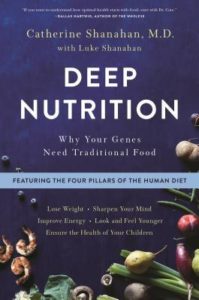
In Deep Nutrition: Why Your Genes Need Traditional Food, Dr. Catherine Shanahan (also known as Dr. Cate) makes a case for the large amounts of bad fats like vegetable oils and sugar consumption in the modern diet causing the rise of metabolic disorders like obesity, diabetes, and even heart disease. The book is split into three sections.
The first deals with epigenetics and illustrates the ways we’ve broken from traditional eating. Dr. Cate explains the science of epigenetics, how our DNA isn’t set in stone at birth but rather environmental factors such as food intake, inform our genes of which to turn on and which to turn off. Not only does this affect our genetic code and lifelong health, but it influences that of our children and future generation.
Part two was the most fascinating to me and also the densest in terms of scientific evidence. Dr. Cate shares new research from the fields of biochemistry and molecular biology that show the dangers of the modern diet. Each chapter explains how these molecules break down in our bodies and the ways they can cause problems through inflammation, oxidation, and cellular disruption. She explains the difference between good fats and bad fats and goes in depth about what your cholesterol and blood glucose levels can tell you about your health and why it’s important to challenge conventional doctors before taking cholesterol medicine.
The last section is the most applicable. She digs into the four pillars of the human diet that are present in all world cuisine. These are meat cooked on the bone, organ meat, fermented or sprouted foods, and fresh unprocessed plant and animal products. Dr. Cate offers an easy way of meal planning as you make changes to incorporate the human diet. She also supplies several meal ideas for breakfast, lunch, and dinner keeping things as simple and basic as possible.
The Most Interesting Takeaways:
- In the chapter, The Sibling Strategy, Dr. Cate recommends that women give themselves at least three to four years between pregnancies to allow their bodies to fully replenish nutrients for the next baby.
- Funding for research studies is often provided by food companies, big agriculture, or pharmaceutical companies, neither of which has an unbiased interest in the findings. Everything comes down to making a profit.
- Eat good natural fats like olive oil, coconut oil, and butter and avoid bad processed ones such as canola, soybean, and sunflower.
- Even health conscious people wind up consuming about 20% of their daily fat intake from vegetable oils.
- Dr. Cate goes into detail about why saturated fat and cholesterol aren’t behind the rise in heart disease or heart attacks. She even explains how to interpret a standard lipid panel and when to be concerned with your results.
- Vegetable oils are terrible for brain health, attacking it in seven different ways, and also leave it susceptible to damage from sugar.
- Sugar is toxic in high levels. Too much disrupts hormonal function and accelerates the aging process. Even though sugar is inflammatory and causes these problems, we would be able to handle quite a bit of it if not for the damage done by vegetable oils.
- Dr. Cate explains why the fasting glucose threshold for diagnosing diabetes should be lowered. She also warns that a glucose level of 89 or higher indicates being on the line of a downward spiral of metabolic issues that lead to diabetes.
- Hypoglycemia is the earliest sign of being on your way to developing insulin resistance. From there it’s a slippery slope to pre diabetes and then finally type 2 diabetes. People with any of these conditions are at risk for all of the complications connected to diabetes.
Quotes from Deep Nutrition:
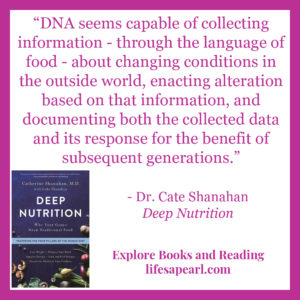
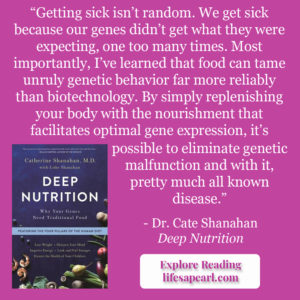
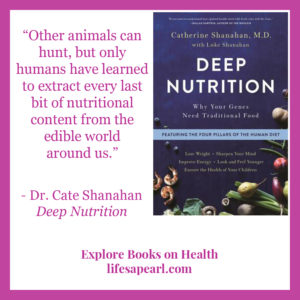
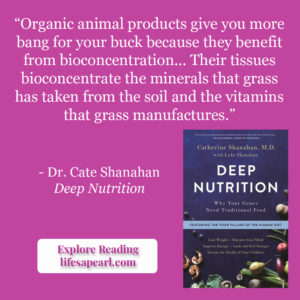
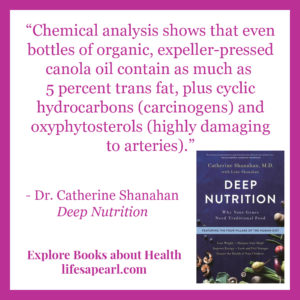
One Negative:
The only part of this book I didn’t like was the chapter on dynamic symmetry. In it Dr. Cate tries to make a connection between health and beauty. While I understood her point that beauty is the result of one’s genetic makeup being optimized, it made me uncomfortable that only one type of beauty was being praised – Marquardt’s mask developed by a plastic surgeon who was looking for the perfect face.
If physical beauty can be the byproduct of good health via taking care of your genes then that’s great but I wouldn’t think it should be the goal. Being driven by health is a better focus. I also read criticism that some of the actors and supermodels she used in her study don’t even fit this framework because they had braces as kids and need vision correction, things she says aren’t necessary if the bones in our facial structures were optimally developed.
I don’t think one chapter takes away from all the wonderful information in this book. If beauty comparisons is something that’s triggering to you, I would just skip it.
Final Verdict:
I loved Deep Nutrition and I wish I’d committed the time to read it sooner especially since I’m pregnant with our first baby. It is a long book and packed with revelations and research. I think taking it slowly is definitely the way to go because it allows those findings to sink in. I’ve found myself referring back to my highlights and notes all month long.
This book is full of applicable strategies for getting rid of vegetable oils and incorporating the four food pillars. In our house, we were already limiting vegetable oils and sugar but this book made it clear how important the oils are to avoid and how many products they are in. For instance I didn’t realize how toxic canola oil is and sometimes used it in baking. I’ve reverted back to making my own salad dressing as well to avoid it.
Deep Nutrition has made me more conscious of my carbohydrate intake and understanding the symptoms of hypoglycemia. We’re cutting carbs especially at breakfast. I was intuitively trying to eat more protein and fats at breakfast than carbs but now I understand why oatmeal doesn’t sustain me for long but an omelette does.
After reading about bioconcentration, we’re more diligent about making sure our local meat is grass fed and organic when possible. I started eating meat again last year after being vegetarian for seven years. Between pregnancy cravings and this book, I’m now quite the carnivore.
We’ve switched back to organic dairy as well and grass fed when we can find it. A couple of days ago, I had my first taste of grass fed butter and could really notice the difference! I found this scorecard from the Cornucopia Institute to be very helpful in ensuring we support dairy farms that truly believe in organic practices.
I plan to continue including more of the four pillars into our diet, trying different kinds of good fats, and working toward reducing my carb intake by half. Dr. Cate’s follow up book, The Fatburn Fix, came out last year and I’m reading that now.
Second Quarter of 2021 Reading List
- The Sleep Revolution: Transforming Your Life, One Night at a Time by Arianna Huffington
- How to Be Everything: A Guide for Those Who (Still) Don’t Know What They Want to Be When They Grow Up by Emilie Wapnick
- The Nature Fix: Why Nature Makes Us Happier, Healthier, and More Creative by Florence Williams
Book Pick for April

In April I’m hoping to learn all about sleep with Arianna Huffington’s book, The Sleep Revolution. With a baby on the way, everyone has been warning us to get all the extra sleep we can now!
In The Sleep Revolution Arianna Huffington explains we are in a crisis of sleep deprivation in our culture. It’s negatively affecting our health, our work, and even our relationships. To get back on track we need a sleep revolution. From the history of it to the latest scientific studies, Huffington explores the transformative power of sleep and the role it plays in our health.
How do you stay informed about nutrition? What dietary changes have you tried to improve your health?
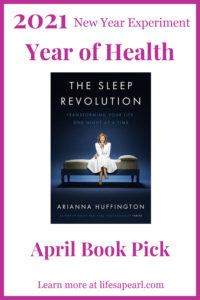
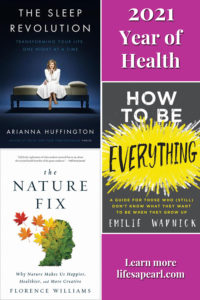

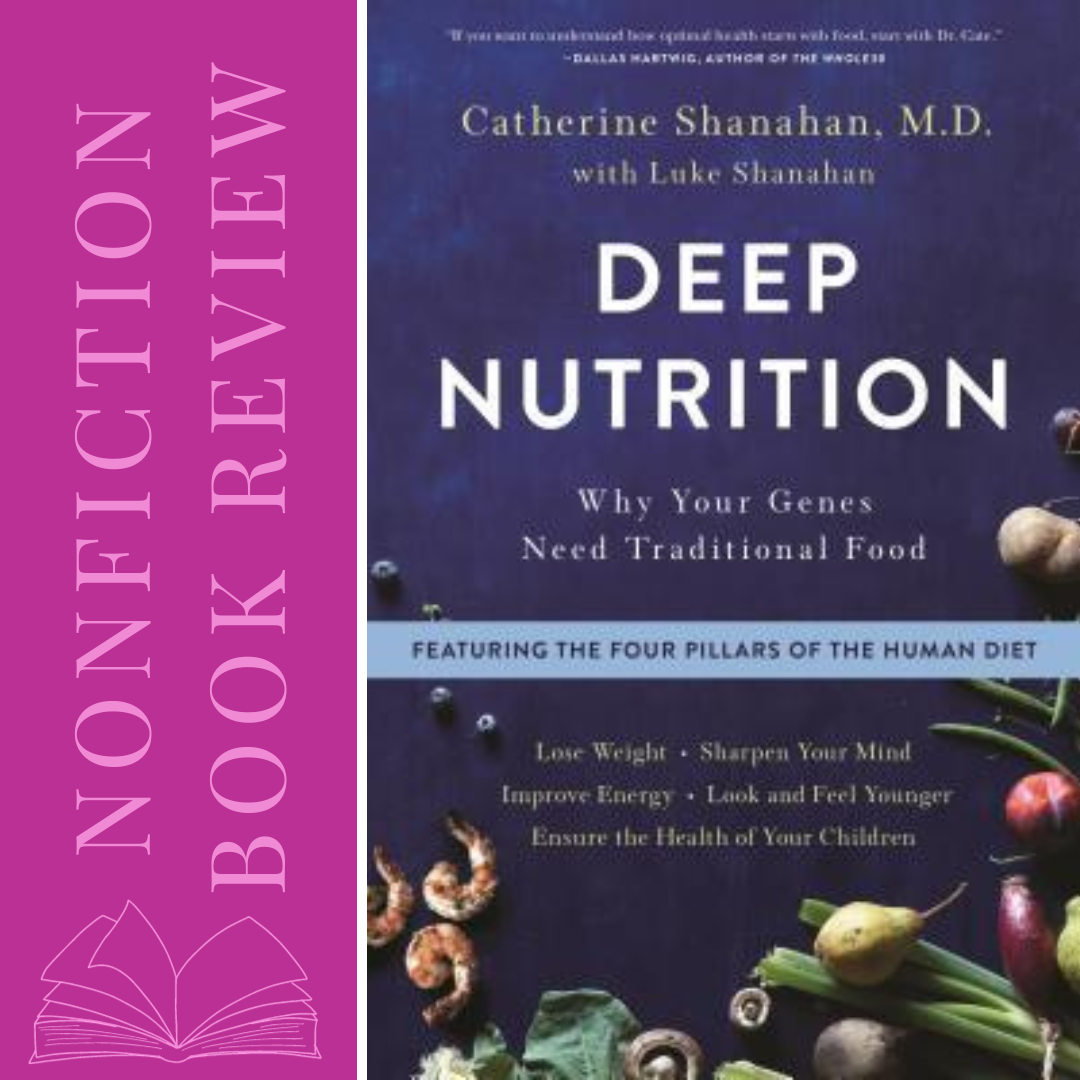
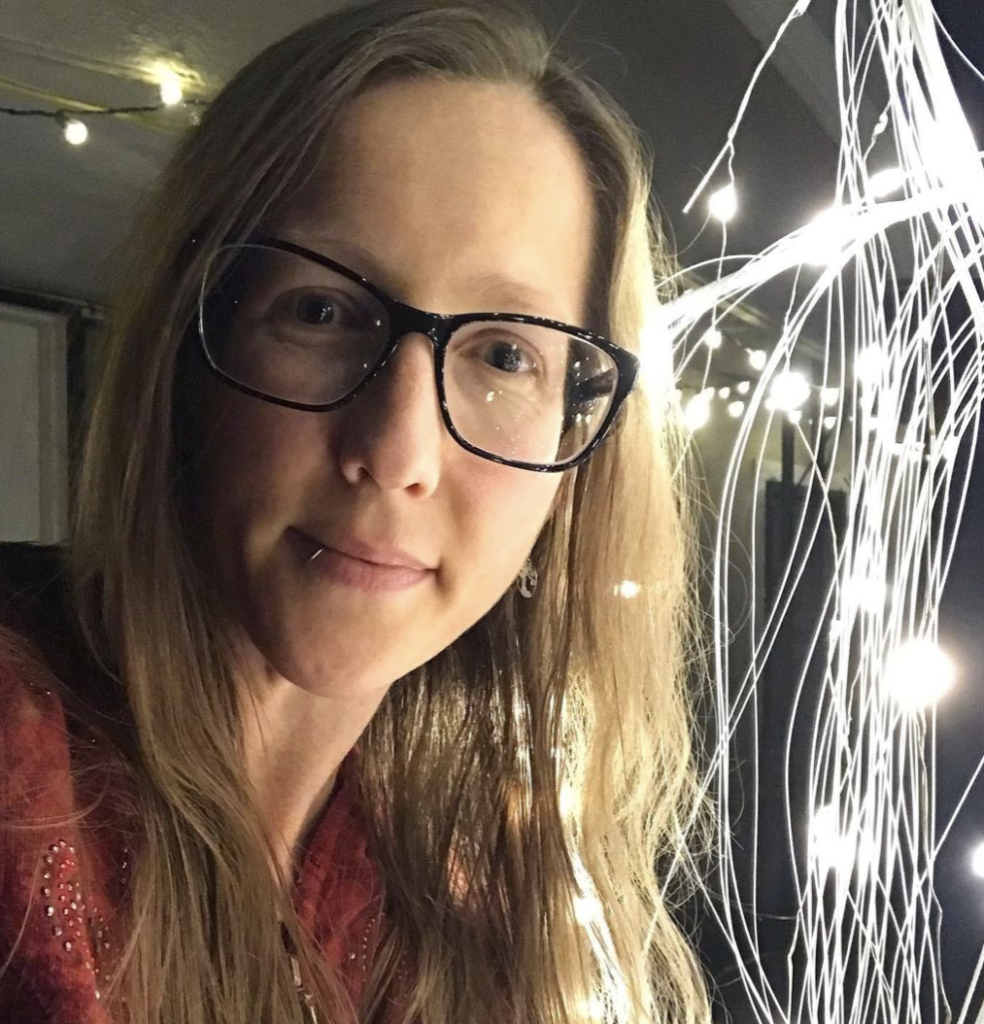
2 responses to “Nonfiction Book Review: Deep Nutrition by Dr. Catherine Shanahan”
Becca!!! Congratulations!! I was loving reading your blog, especially with all the super helpful wisdom packed into it, and then read you are expecting!!! Sooo happy for you guys!! Keep up the great writing! ???
Thank you so much Kathie. Your kind words and encouragement made my day! I hope you two are enjoying life up North!